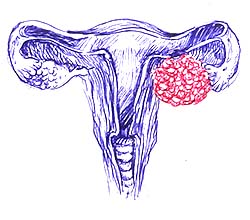The Reality of Ovarian Cancer
Ovaries are the reproductive glands found in females. Ovarian cancer happens when a cancerous growth is found in the ovary.

REALITY CHECK
According to the National Cancer Registry, ovarian cancer is a common cancer among women in Peninsular Malaysia, making up five percent of all female cancer cases.
Common Types of Ovarian Cancer
EPITHELIAL OVARIAN CANCER
It begins in the layer of cells that cover the ovary and the entire abdominal cavity. This is the most common ovarian cancer type, accounting up to 90 percent of all cases.
GERM CELL OVARIAN CANCER
Germ cell ovarian cancer begins in the egg-producing cells inside the ovaries. Those who are prone to have this type of ovarian cancer are usually women in their 20s and teenage girls.
SEX CORD-STROMAL OVARIAN CANCER
Sex cord-stromal ovarian cancer originates in the connective tissue of the ovaries, which also produces the female sex hormones. About 60 – 95 percent of ovarian sex cord-stromal cases are diagnosed at Stage I and can be treated by surgery alone.
Staging and Grading
Once you have been diagnosed positive for cancer after a biopsy test, the condition will be given a stage and grade. This vital information will help you and your healthcare team to choose the best treatment for you. The cancer stage will describe the size of the tumour and how far it has spread.
There are 4 stages for ovarian cancer:
Stage 1
- The cancer is only within the ovary
- It has not spread to organs and tissues in the abdomen or pelvis, lymph nodes, or further areas
Stage 2
- The cancer is in one or both ovaries and has spread to other organs within the pelvis
- It has not spread to lymph nodes or distant sites
Stage 3
- The cancer is in one or both ovaries
- The cancer has either spread beyond the pelvis to the lining of the abdomen or the cancer has spread to the lymph nodes in the back of the abdomen
Stage 4
- This is the most advanced stage of ovarian cancer
- The cancer has spread to the inside of the spleen, liver, lungs, or other organs located outside the abdomen and pelvic region
There are 3 grades of ovarian cancer:
Grade 1 – It is low grade, and the cancer cells look very much like normal ovarian cells and are less likely to spread.
Grade 2 – It is an intermediate grade, and the cancer cells look slightly like normal ovarian cells.
Grade 3 – It is high grade, and the cancer cells look very abnormal and are likely to spread.
WARNING SIGNS
- Pain in the lower stomach
- Pain on the lower side of the body
- Pain in the pelvic area
- Back pain
- Experiencing pain during sexual intercourse
- More frequent and urgent urination
- Indigestion or heartburn
- Feeling full quickly when eating
- Changes in bowel movement, such as constipation
Ovarian Cancer Myths Vs Facts
Myth |
Fact |
| My annual Pap test will detect ovarian cancer | Actually, a Pap test only screens for cervical cancer, NOT ovarian cancer. |
| Ovarian cysts always turn into ovarian cancer | Studies show that the majority of ovarian cysts will not grow into ovarian cancer |
| I’ve had a hysterectomy so there is no chance of getting ovarian cancer. | Total hysterectomy removes the uterus, ovaries, fallopian tubes, and cervix. Although having a hysterectomy greatly reduces your risk, there is still a small chance of developing ovarian cancer. Be aware of any symptoms and consult your doctor. |






